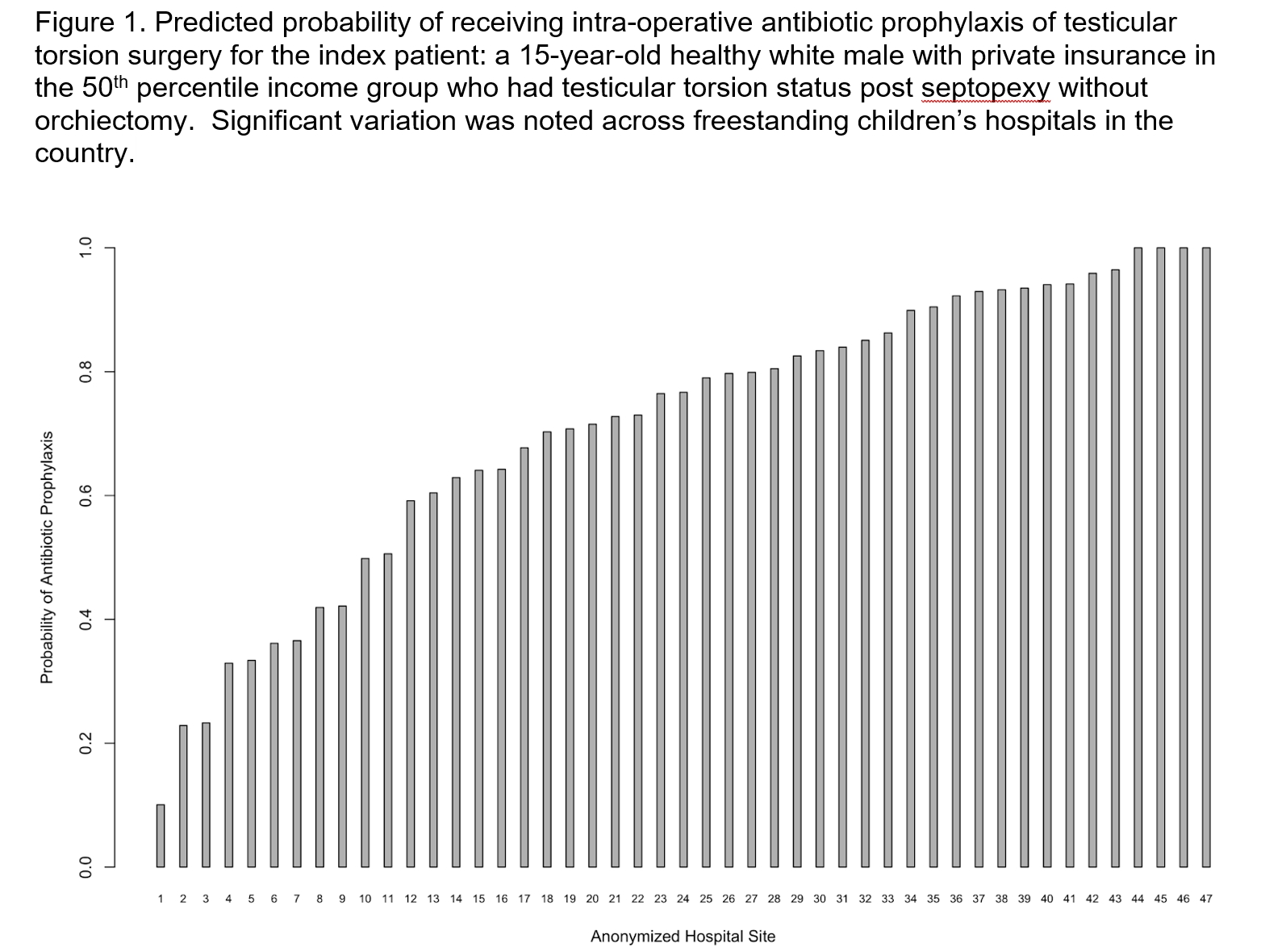Back
Poster, Podium & Video Sessions
Moderated Poster
MP11: Pediatric Urology: Neurogenic Bladder, Reconstruction & Urologic Emergencies
MP11-20: Significant Antibiotic Use Variations In Pediatric Testicular Torsion Surgery Among US Free-standing Children's Hospitals
Friday, May 13, 2022
1:00 PM – 2:15 PM
Location: Room 225
John Panagides*, Dylan Cahill, Rachel Saunders, Hsin-Hsiao Wang, Boston, MA

John Panagides, BS
Harvard Medical School
Poster Presenter(s)
Introduction: There is no robust evidence for the efficacy of intraoperative antibiotics in preventing infections in testicular torsion surgery. In the absence of clear guidelines regarding appropriate use of antibiotic prophylaxis, the factors influencing these differences in practice pattern remain unclear. Our study aimed to identify both patient and institution level factors affecting whether a pediatric patient undergoing emergency testicular detorsion (orchiopexy or orchiectomy) will receive antibiotic prophylaxis.
Methods: We utilized the Pediatric Health Information System (PHIS) database to identify patients <=18 years-old who underwent testicular septopexy or orchiectomy with diagnosis of torsion of the testis between 2015 and 2021. Patient visits for repeated presentations of torsion were excluded from the analysis. We used multivariate logistic regression to evaluate if pre-procedural antibiotic prophylaxis was associated with hospital-level factors (treating hospital) or patient-level factors (case complexity, concurrent orchiectomy, age category, race/ethnicity, income quintile, insurance).
Results: We included 5,305 children who underwent surgeries for testicular torsion. Median age was 13 (IQR 10-15 years). 74.0% patients received antibiotic prophylaxis. Compared to no antibiotic prophylaxis, those who received antibiotic prophylaxis were significantly older (p < 0.001). After adjusting for race/ethnicity, orchiectomy vs septopexy, income quintiles, insurance, and comorbidities, older age (12-18 years compared to the 0-12 age group, OR=1.62 (95% CI 1.41-1.87, p<0.001) and hospital (p < 0.001) remained significantly associated with choice of antibiotic prophylaxis for testicular torsion surgeries. Figure 1 demonstrates the predicted probability of receiving antibiotic prophylaxis for an index patient by PHIS hospitals.
Conclusions: There is wide variation in antibiotic prophylaxis use for patients undergoing testicular detorsion at freestanding children’s hospitals in the United States. Older patients are more likely to receive antibiotic prophylaxis prior to the testicular torsion surgery. Given the risks associated with excessive antibiotic use, an understanding of the factors and proper standardization is warranted.
Source of Funding: none

Methods: We utilized the Pediatric Health Information System (PHIS) database to identify patients <=18 years-old who underwent testicular septopexy or orchiectomy with diagnosis of torsion of the testis between 2015 and 2021. Patient visits for repeated presentations of torsion were excluded from the analysis. We used multivariate logistic regression to evaluate if pre-procedural antibiotic prophylaxis was associated with hospital-level factors (treating hospital) or patient-level factors (case complexity, concurrent orchiectomy, age category, race/ethnicity, income quintile, insurance).
Results: We included 5,305 children who underwent surgeries for testicular torsion. Median age was 13 (IQR 10-15 years). 74.0% patients received antibiotic prophylaxis. Compared to no antibiotic prophylaxis, those who received antibiotic prophylaxis were significantly older (p < 0.001). After adjusting for race/ethnicity, orchiectomy vs septopexy, income quintiles, insurance, and comorbidities, older age (12-18 years compared to the 0-12 age group, OR=1.62 (95% CI 1.41-1.87, p<0.001) and hospital (p < 0.001) remained significantly associated with choice of antibiotic prophylaxis for testicular torsion surgeries. Figure 1 demonstrates the predicted probability of receiving antibiotic prophylaxis for an index patient by PHIS hospitals.
Conclusions: There is wide variation in antibiotic prophylaxis use for patients undergoing testicular detorsion at freestanding children’s hospitals in the United States. Older patients are more likely to receive antibiotic prophylaxis prior to the testicular torsion surgery. Given the risks associated with excessive antibiotic use, an understanding of the factors and proper standardization is warranted.
Source of Funding: none


.jpg)
.jpg)